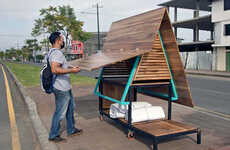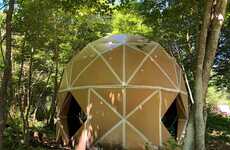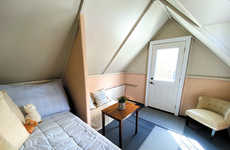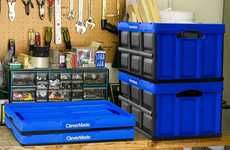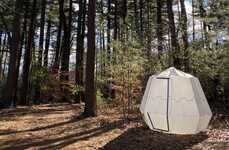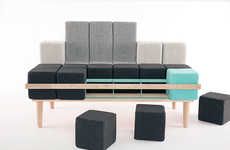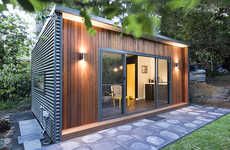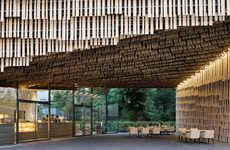
These Shelters are Made with Easily Accessible Materials
Michael Baxter — May 3, 2014 — Art & Design
References: lau.edu.lb & designboom
These plastic crate shelters were created by third year architecture students as an alternative for those who need something sturdy and easy to make. There are a few support columns, but other than that the shelters are made out of zip ties and crates exclusively.
As the race to weed out the concept of homelessness continues, we're seeing more and more inventive ways to procure shelter. This particular shelter gives the user natural light and wind while also being sturdy and easy enough to maintain.
Every crate can be used as a storage unit as well as a chair or table making for a customizable experience for the user. Their shelter can be filled with as many furnishings as they can fit and they'll always have room to store their belongings.
Photo Credits: designboom, lau.edu.lb
As the race to weed out the concept of homelessness continues, we're seeing more and more inventive ways to procure shelter. This particular shelter gives the user natural light and wind while also being sturdy and easy enough to maintain.
Every crate can be used as a storage unit as well as a chair or table making for a customizable experience for the user. Their shelter can be filled with as many furnishings as they can fit and they'll always have room to store their belongings.
Photo Credits: designboom, lau.edu.lb
Trend Themes
1. Alternative Shelters - The use of easily accessible materials for building shelters presents an opportunity for disruptive innovation in the housing industry.
2. Customizable Living Spaces - Designing shelters that allow for personalization with multi-functional furniture offers disruptive innovation potential in the interior design industry.
3. Sustainable Architecture - Creating shelters that maximize natural light and ventilation provides an opportunity for disruptive innovation in the construction industry, promoting eco-friendly practices.
Industry Implications
1. Housing - Developing affordable and easily constructed alternative shelters presents a disruptive innovation opportunity in the housing industry.
2. Interior Design - Designing customizable living spaces using versatile furniture materials opens up disruptive innovation possibilities in the interior design industry.
3. Construction - Incorporating sustainable architecture practices into shelter construction presents disruptive innovation opportunities in the construction industry, promoting environmental consciousness.
3.2
Score
Popularity
Activity
Freshness



